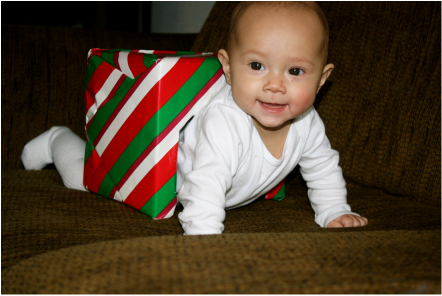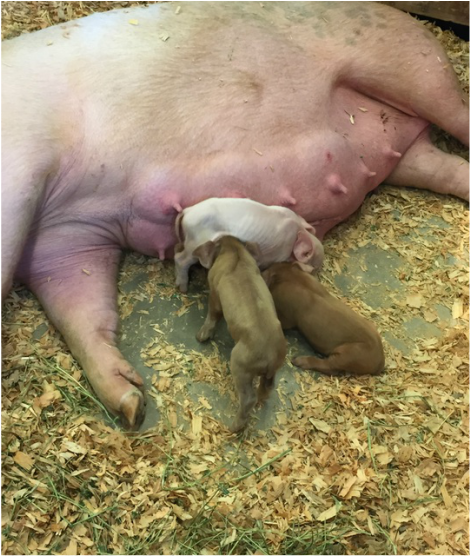|
I hope everyone has had a peaceful and healthy start to the new year. Along with the dawn of a new year comes many a resolution(s). I've never been all that great personally at keeping my resolutions so I usually rename them as "priorities". So instead of saying that my resolution is to lose x number of pounds I focus on what I need to do to get there, namely increasing exercise and eating healthy, and try to prioritize those things in my life. Anyway, enough about me.
I wanted to post this blog specifically as it relates to weight loss and breastfeeding. I know many mamas are ready to shed extra baby weight, and often the new year provides motivation to focus on that goal. Here are a few common questions regarding losing weight and breastfeeding: Doesn't breastfeeding burn an extra 500 calories per day? Won't I lose weight anyway? The answer is that breastfeeding can burn UP TO an extra 500/cals per day but that number may be different for different women. And some women feel very hungry when breastfeeding and may compensate for those extra calories burned by taking in more food because the fact is, they're just hungrier! Feeding another person is no small feat! So while your body may be burning extra calories you may feel hungrier and any extra calories burned may be negated by eating more. A close friend told me after she started breastfeeding her first baby that she’d never felt that hungry in her entire life! Can I do a cleanse or use herbal supplements to help lose weight? The short answer is no, they are not recommended. There are a variety of cleanses on the market – juices, smoothies, etc. A cleanse may cause you to lose weight due to the low calories that many of them have, and decreasing calories will most likely lead to weight loss. However, cleanses may be too low in calories and risk impacting milk production. And, if you’re clearing toxins out of your body, there’s no guarantee that some of those toxins won’t end up in your milk. While it varies from woman to woman, most lactating moms should not allow their calorie intake to go below 1800 calories per day. Also, some products that contain herbal supplements such as appetite suppressants are definitely something to avoid while breastfeeding. How much exercise is ok while breastfeeding? Exercise as much as you are able to! If you haven’t been active in a while, you will want to start out slowly and avoid overdoing it. If you can, incorporate baby into the exercise. Take baby out for a walk in a stroller or babywear – add in some lunges and squats while you are walking! The fresh air will be great for him or her too! An exercise video at home while baby naps is another way to get some exercise. Try Betty Rocker’s 30 day challenge for FREE! 15 minute work-outs that can be done in your home. My understanding is that they are intense though, so maybe work up to Betty Rocker! If you would like a more formal setting such as a gym or exercise class, you can do that too! And, some places even offer childcare! A few tips to keep in mind when exercising: 1. A well-fitting sports bra is a must 2. Feed or pump prior to exercising to avoid becoming engorged during a work-out (though you know your body and baby the best and this may not be necessary) 3. Baby may not like the salty taste of sweat post-workout, so you may need to wipe off excess sweat prior to feeding baby after a workout. And here’s a few best practices to keep in mind before starting to lose weight:
The bottom line is a moderate reduction in calories and incorporating exercise into your day are both healthy ways to lose weight without affecting your milk supply.
9 Comments
I often hear moms in the hospital ask, "Besides alcohol, are there other foods (or drinks) I should not have while breastfeeding?". And my reply is always the same: you CAN have alcohol while you're breastfeeding. Now I am not saying go out with reckless abandon, but I want moms and families to realize that breastfeeding is not intended to be restrictive. There are those alcohol test strips sold in stores which, in my personal opinion, are unnecessary. Go by how you feel. If you feel that you can safely drive a car, or hold your baby, it's fine to breastfeed your baby. Jack Newman posted on Facebook a couple of years ago a study done by a mom in a toxicology lab who tested alcohol levels in her milk. The post is below and I feel it does more justice to the topic than I could: Dr.Jack Newman December 21, 2014 · Reposting on alcohol and breastfeeding. Happy holidays all. Since the holidays are imminent, even started, many of you may want to have a couple of alcoholic drinks. You do not have to "pump and dump" (a terrible expression) afterwards and you don't have to wait a certain time after your more recent drink in order to restart breastfeeding. The amount of alcohol that gets into the milk is tiny and will not hurt the baby. Think of it this way, in most jurisdictions, you are too impaired to drive if you have 0.05% alcohol in your blood. Alcohol appears in the milk in the same concentration as in the blood. Thus if you have 0.05% alcohol in your blood you will have 0.05% alcohol in your milk and as it decreases in your blood, it will decrease in your milk. Even de-alcoholized beer sold in my local store has 0.6% alcohol, more than 10x more than the breastmilk will contain if it contains 0.05% alcohol. I am not saying it's fine to get falling down drunk because if you are breastfeeding, you must not drop the baby, but the problem is your coordination not the amount of alcohol in the milk. Also from last year: The following is from a blog by a mother who tested her milk for alcohol. Not one of those useless kits that you can buy at various stores, but tested at a toxicology laboratory. I will copy from her blog the method she used and the results. I think this puts the lie to the notion that women should not drink while breastfeeding or need to "pump and dump" (an appalling term) after having even one drink. The following is an exact quote from her blog: Method: First I took a sample of my milk (about 1 mL) prior to drinking any alcoholic beverage. I expressed the milk mid-nursing session to ensure I had a goodly portion of fore & hind milk. After completing the nursing session, I mixed myself an alcoholic beverage consisting of 2 oz of 80 proof (40%) vodka in 10 oz of soda (Sprite). I proceeded to drink the entire 12 oz in about 30 minutes. About 30 minutes after finishing (1 hour after beginning to drink), I expressed some milk (about 1 mL) and labeled it 'immediate'. I then waited 1 hour and expressed more milk (about 1 mL) and labeled it '2 hours'. In the 2 hours (from the beginning), I did not drink any more alcoholic beverages, drink other beverages, or eat any other foods. Another day, 1/2 of a beer (4.3% alcohol) and 2-6 oz glasses of wine were consumed within 1.5 hours. About an hour from the beginning of the last drink, a milk sample (about 1 mL) was taken. This sample was labeled '1 hour - 3 drinks'. Another sample was taken about an hour after that (2 hours after the beginning of the last drink). This sample was labeled '2 hours - 3 drinks'. The samples were stored in the refrigerator until processing. An Agilent headspace instrument was used to run the tests. Propanol and ethanol standards were also tested to ensure the instrument was within limits. The instrument is maintained by the KSP Lab Toxicology Section and used in forensic determinations of blood and urine alcohol content. Results: The sample labeled as 'immediate' registered as 0.1370 mg/mL which correlates to 0.01370% alcohol in the sample. The sample labeled '2 hours' registered as 0.0000 mg/ml which correlates to 0.0000%. The sample labeled '1 hour - 3 drinks' registered as 0.3749 mg/mL which correlates to 0.03749% alcohol in the sample. The sample labeled '2 hours - 3 drinks' registered as 0.0629 mg/mL which correlates to 0.00629% alcohol in the sample. Conclusion: The alcohol content in breast milk immediately after drinking is equivalent to a 0.0274 proof beverage. That's like mixing 1 oz of 80 proof vodka (one shot) with 2919 oz of mixer . By the way, 2919 oz is over 70 liters. Two hours after drinking one (strong) drink the alcohol has disappeared from the sample. Completely harmless to the nursing infant. Drinking about 3 drinks in 1.5 hours resulted in higher numbers, but still negligible amounts of alcohol would be transferred to the child. One hour after imbibing in 3 drinks, the milk was the equivalent of 0.07498 proof beverage. That would be like adding 1 oz of 80 proof vodka (one shot) to 1066 oz of mixer (1066 oz is over 26 liters). Two hours after imbibing in 3 drinks, the milk was 0.01258 proof. That would be like adding 1 oz of 80 proof vodka to 3179 oz of mixer (over almost 80 liters). So, even though an infant has much less body weight, any of these percentage of alcohol in breast milk is unlikely to adversely affect the baby. However, all that said, if you aren't sure how you may react to alcohol (especially if it's been 9+ months since your last drink), it may be best to have a little milk stored in the refrigerator or freezer should you not feel comfortable breastfeeding. If you decide to use your expressed milk to feed baby, just be sure you pump/express so your body doesn't think you missed a feeding. And, please be sure you're not under the influence of alcohol if you bedshare. Yes, it's a thing. The holiday season is one of the busiest times of the year with moms feeling pulled in many, many different directions - cooking, planning, buying gifts, traveling, coordinating - and that's in addition to the usual daily tasks of childcare, meal-planning, cleaning, and general household upkeep.
Needless to say, moms can feel overwhelmed during the holidays. It's easy to try to hold baby off from feeding so you can finish your holiday baking or hand baby off to a visiting relative so he or she can enjoy some baby snuggles (because really - who turns down baby snuggles??). Or maybe Aunt Josie offers to give baby a bottle so you can get some rest or clean the house. Perhaps there's a holiday party you want to go to. All of these activities, while they seem harmless, if done repeatedly may inadvertently send baby a message that he's being put off or getting his meals from another source. Baby may start to seem less interested in breastfeeding or possibly even go on a nursing strike. Moms may interpret the lack of interest in breastfeeding as baby starting to wean, but that's most likely not the case. It's important to keep breastfeeding up during the busy holidays and maintain that bond with your baby. In addition to making sure baby's needs are met, continuing to feed frequently will help ensure that moms don't get plugged ducts or mastitis (both of these are especially common in the busy holiday season!). Here are 5 tips to help prevent accidental holiday weaning:
This blog post will be the 1st of 3 that will discuss holiday related breastfeeding topics. I received an email this morning that I wanted to pass along as I feel almost any Mama can benefit from it, but especially those who are adjusting to life with a new little one. It's an online Mama Mini Retreat done in the comfort of your own home, in your pj's, in your favorite chair while drinking your favorite warm beverage -- and it's free:
This three day virtual retreat will offer resources for mothers to center and nourish before the whirlwind of the holiday season sweeps us away. This self-paced course is designed for mamas just like you. For three days you will receive an email from the course with a link to take you right to the lesson of the day. Starts December 5th You will receive:
interested? Sign up here. I recently went to the Washington State Fair. You know, lots of typical fair things – corn dogs, roller coasters, live animals, etc. What made me pause was later in the day when we were seeking shelter from a sudden downpour of rain, we went into an exhibit that had pigs and piglets. Super cute – baby pigs are adorable. On one side of the exhibit, there was a mama pig nursing her piglets. In case anyone is curious, she was in side-lying position ;) The baby pigs had their choice of many a nipple to pick from. Lots of people were crowded around this mama feeding her babies. The sounds of “oooohh, how cute!” were heard throughout as well as lots of giggles as one baby pig was lying across the head of his brother and sister. I asked my 4 year old who nursed well into toddlerhood what the baby pigs were doing and her reply was “getting boo” with a huge smile across her face. That’s what she calls breastfeeding. I kept waiting for the spectators to start saying things like, “what a hussy! How can she be doing THAT in public?” and “look at her – clearly, she’s just TRYING to get attention” and “My gosh! Why doesn’t she cover up??”. It was so interesting to me that people were bringing their children in to see these pigs and not shielding their eyes from pig boobies. Why is it so different when humans feed their babies? The baby is EATING from a breast, what it is biologically designed for. As a society, we have a long way to go when we people have this mentality: I know in some cases, the mom prefers to cover-up and that’s fine if you’re more comfortable doing so – perhaps you’re using a nipple shield or your baby pulls off the breast during a letdown, or he gets distracted during feeding. If you are more comfortable covering up, that’s your right to do so, but please don’t do so to make *other* people comfortable. The more frequently people see women feeding their babies at breast, the more normalized it becomes (the fact that we having to normalize feeding your baby at breast is a whole other post).
I often compare breastfeeding to marathons. Why you ask? Because both require training, there's a learning curve to both, and neither are easy . I am certainly NOT a runner by any stretch of the imagination, but I definitely see the parallels between the two. My own personal motto of running is more like this:
Anyway, I do find that marathons and breastfeeding have a lot in common and more than just a marathon feeding session which you WILL feel like is happening when you are breastfeeding a newborn. If you decide that you want to run a marathon, what is the one of the first things you’ll do? Probably some research on the training and how long you should plan for in order to be marathon-ready. Here’s my list of what marathons and breastfeeding have in common:
 In regards to breasts, they truly come in all shapes and sizes – xs to XL. Often women think that because their breasts are small that they cannot breastfeed, or sometimes we hear the opposite – that breastfeeding may be difficult because of having larger breasts. True, there are some accommodations and positioning adjustments that women with large breasts may have to make, but that doesn’t mean they can’t breastfeed. And, women with small breasts are more than capable of producing enough milk for their babies. One thing that lactation consultants hear frequently (or at least I do!) is that moms are concerned they aren’t making enough milk because when they pump they “only pump 3 ounces at a time and their friend always pumps 8 oz ”. We naturally compare ourselves to our friends, family, co-workers, etc. but lactation is one area that really is highly unique based on each mom and her baby. We really can’t and shouldn’t compare ourselves to our breastfeeding friends. It’s true – some women can pump more in one session than I ever could in 3 combined, but that doesn’t mean I have a low supply. What it may mean if you are one of the moms who pumps 2-3 ounces each time is that your baby may need to feed more frequently (or may not – keep reading to find out more) – which is why it’s so critical to feed on baby’s cues and not by a clock. Anywhere from 8-12 (or more!) feedings in 24 hours is normal, particularly the first several months of breastfeeding. Babies’ calorie requirements stay remarkably stable at approximately 30 ounces per 24 hours from 1 month until 6 months of age. Also, a pump is not a good indicator of how much milk you produce – the pumps tells you how much milk you can pump, so while you may pump 3 ounces baby may take in 4 ounces at breast because she will be much more efficient than a pump at removing milk if she has a good latch. And going back to the title, breast size may impact the storage capacity of your breasts (yes, larger breasts likely have the ability to hold more milk) but having smaller breasts does not mean you won’t produce enough for your baby. Trust your body, watch for baby’s feeding cues, and let him decide how long he wants to feed. Those things are much more important than the size of your breasts. Through my work as an IBCLC (International Board Certified Lactation Consultant), I've spent time in a few different hospitals working with moms and newborns and helping them learn how to breastfeed. In my (admittedly) short time as a Lactation Consultant or training to be one, one thing became clear to me. Most moms, especially first time moms, leave the hospital with a lot of uncertainty about breastfeeding. It can be overwhelming. What I'm hoping to accomplish in this post is how you can maximize your time with your lactation consultant. I've spent time in three different hospitals either as a volunteer or as paid lactation staff. While each hospital was different, what they all had in common is that there are waaaaayyy more moms and babies than there are lactation support staff. Our job is to help you succeed with breastfeeding but we are confined by time. Meaning our time with you one-on-one is generally going to be fast - anywhere from about 15 minutes to about 45-60, at most. In addition to the time being short, we also have other factors to consider. Often most moms are physically exhausted from labor, have been up all night, and are sleep deprived due to an ever-revolving door of people checking on you or baby making the situation a less than ideal learning environment (think of your 8am Friday morning college stats class after a Thursday night out). Here are 5 tips that I hope may help you maximize your hospital lactation experience: 1 - take a prenatal breastfeeding class. Having a baseline level of breastfeeding info and knowledge is incredibly helpful to build on. 2 - think about questions you may have and write them down (if you're creating a birth plan, writing the questions and keeping them with your birth plan would help ensure they get taken to the hospital). You can also jot down your questions once you're in the hospital and have started breastfeeding. You'll likely be asked to log your baby's feeds and dirty diapers - you can write your questions here. 3 - if you've struggled with breastfeeding in the past, have a brief summary ready to share of what your struggles were (ex: low supply, return to work and unable to pump, undiagnosed tongue tie). 4 - if you've had any breast surgeries please tell us. Often this info is in your chart, but not always and it's not always easy to find quickly. Again, we are often limited in time and will take a look at your chart prior to going in your room but may not notice if there was mention of breast surgeries, including breast augmentation, lumpectomy, breast reduction, etc. All of these may affect lactation and it's very important that we are aware if you've experienced any of them. 5 - if breastfeeding is incredibly important to you, let your partner know and ask him or her to support you in your goals. One way he or she can do this is to listen to what the LC has to say. Many significant others disengage with lactation because "they can't feed the baby", but what many partners don't realize is how truly significant their role is in supporting mom with breastfeeding. Being aware of what's normal in regards to newborns and feeding will go a long way with Dad/SO being able to say, "the baby's cluster feeding. I know it's frustrating but I remember the LC saying this is normal. I know I can't feed the baby but I'm happy to take care of dinner since I know our baby needs you right now." If you have other tips, please share!
|
AuthorJust Carrie wanting a space to write about being a mom to 2, boob nerd, military wife, and food enthusiast. But mainly a place to talk about boobs and babies! Archives
March 2019
Categories |
|
LOCATION
Olympia Office (effective April 2024):
2627 Martin Way E, Olympia WA 98506 Pierce County: Appointments available in Steilacoom - see schedule page for details and availability! Providing lactation consults to families in Olympia, Lacey, Tumwater, Steilacoom, DuPont, Grays Harbor, Yelm, Rainier, and surrounding areas. |
|
We support equal rights and inclusion. LGBTQIA+ friendly.





 RSS Feed
RSS Feed


